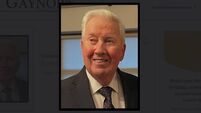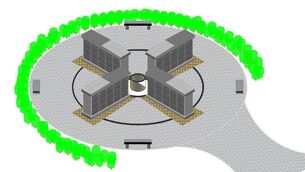‘My experience is that there is very little power to decide on anything’

Cllr Donal Kilduff.
In 2019, when Donal Kilduff was elected as a new councillor, he was naturally full of enthusiasm to deliver key projects in the Athlone Municipal District.
Over his tenure, Cllr Kilduff feels he has played an important role in delivering numerous projects to local communities, including town and village renewal plans in Lecarrow and Knockcroghery, as well as drainage schemes in Toberdan, Knockskehan, Knockanyconnor, Carna, and the Lecarrow scheme, which is set to commence this year.
Local communities in the municipal area have also benefitted from significant climate adaptation funding, and you sense the Independent councillor’s particular satisfaction with a low cost safety scheme which led to road widening on the approach to a local school in his native Glanduff.
Clearly, he‘s proud of his contribution to these and other projects, and his work on trying to seek solutions on larger scale issues, such as addressing safety issues on the N61 and the crisis at Lough Funshinagh.
But despite being “torn” on the decision not to seek re-election, his frustration at what he sees as the lack of decision making and autonomy at local authority level dominates a lot of our conversation.
“Everything is centralised in the country. So what it takes to get these things done is, somebody has to fill out an application form to apply to the department for sanction and funding to do these things. We as councillors don’t get to decide on this stuff.
“We can decide that we want somebody to fill out an application form, but that’s where the decision-making ends right. We were fortunate to have people in the Athlone Municipal District Office who were very proactive in seeking to draw down as much funds from the department as possible.”
His clear interest in highlighting the need for local government reform brought him to the Seanad last November where, along with other councillors around the country, he presented in public hearings on the “future of local democracy”.
In that Seanad presentation, he called for more significant enhancements of the powers of local elected representatives. The key, he said, is greater autonomy for local authorities.
In his Seanad presentation, he noted: “If we’re going to go to the trouble of holding elections every five years and elect representatives, then those representatives need to have powers to decide on things of local importance.
“My experience is that there is very little power to decide on anything.”
During our interview, Mr Kilduff is very keen to point out that he had a great relationship with the executive and the council itself.
“I am torn. On the one hand, I accomplished a good deal. I set out to improve amenities and conditions for my community and, to a large extent, I achieved that in many respects.
“On the other hand, I’m just desperately frustrated with the system.”
A large part of his frustration is to do with what he sees as the lack of engagement by national stakeholders to help progress what was his main election priority back in 2019 — safety issues along the N61.
“That was my main priority, and I canvassed the whole of the municipal area in seven weeks.
“I had a great team of canvassers and we went to every door and I personally canvassed all the houses on the N61, telling people at the door this is my No 1 priority.
“But then you get elected and you set about to deliver what you promised, and it took three years and three months to get a meeting with Transport Infrastructure Ireland just to discuss that road.
“I would say the reason why the meeting took so long to happen is that they were under no obligation to meet, they were not going to be sanctioned for not meeting us.
“My view is that a meeting should have been facilitated within three months, and I don’t think that’s unreasonable.
“We discussed the N61 at every council meeting during those three years and three months, because it was between that and Lough Funshinagh, they were the No 1 issues locally. These are the issues that everyone is concerned about here.
“So we had locally elected representatives having an input into trying to solve that, but it becomes very frustrating if we can’t even get to talk to the people who are instrumental in delivering a solution — those who have the money and the authority to do the work, because we don’t have the money and we certainly don’t have the authority.
“ I thought having gone before the people, and gotten elected in a democratic country, that my mandate would at least allow me to sit down and talk with people who could make stuff happen within a timely fashion.
“That has not been my experience.”
The irony about the long wait for a meeting with the Transport Infrastructure Ireland (TII) is that there was very constructive engagement straight away at that meeting, with a commitment to fund a strategic assessment of the N61 from Athlone to Roscommon.
It took another 16 months for that report to be delivered, but TII gave a further commitment to fund a series of interventions on this national secondary road over the course of a number of years to the tune of several million euro.
Two of them — junction realignments near St Brigid’s GAA and St John’s Church — will be advanced to design phase this year.
Mr Kilduff is very happy about that significant progress, but estimates that it could take another three years for the design and build of these schemes.
“That will be eight years after I got elected. That’s what frustrated me. In my view, we’re three years behind schedule on that, as the meeting should have been facilitated within three months. That’s what I feel is dysfunctional about this system. There was absolutely no reason why that meeting should not have been facilitated within three months.”
He points to this N61 episode, which “broke his spirit as a councillor”, as symptomatic of the wider problems facing local government. “I mean, that’s typical of what happens at our council meetings. We debate issues, we pass motions and resolutions of the council, and the result is that a letter is either sent to a state agency or a department or a minister and a typical response results in a vague response sometime later.
“That’s what happens. The reason we’re talking about the same issues over and over again is because we can’t get constructive engagement with the key stakeholders.
“If there was constructive engagement, even if the issue wasn’t solved, but if there was constructive engagement, there wouldn’t be this repetitive nature of talking about the same issues.”
That lack of proper engagement from state agencies is something that frustrated him throughout his tenure, not least with councillors’ efforts to address the Lough Funshinagh crisis.
Recalling a time in 2020, when he was chairperson of the Athlone Municipal District, he pointed out that a formal request was sent to the Office of Public Works (OPW) to attend a municipal meeting to engage on the issue of Lough Funshinagh.
“We were politely told that the OPW does not have the resources to attend municipal meetings.” Following his motion and resultant council resolution in November 2020, formal correspondence was also sent to National Parks and Wildlife Service (NPWS) seeking a review of the special areas of conservation (SAC) status of Lough Funshinagh.
“They didn’t even respond to that and we were in the middle of a crisis.”
“We were hopping up and down as councillors to try and get national stakeholders such as the OPW and NPWS, to meet us, and my view is that they should have been hopping up and down to get meetings with us to do something.”
He is of the view that, if councillors had more autonomy in making decisions and were able to advance a flood relief scheme at Lough Funshinagh to a formal process, there would be a much different outcome now even in the face of a legal challenge.
“I honestly believe that if a decision had been taken to advance to a formal process in 2016, after the first time there was a crisis at Lough Funshinagh, there would have been sufficient work done that the judge would have taken a different view if it was challenged.
“Regardless of the outcome of that formal process, when the emergency struck in 2020, the actions would have had a fair greater chance of survival and standing up in court.”
More broadly, he believes that when it comes to reform of local government, Ireland needs to look at the Swiss model.
“In Switzerland, it’s not top down, it’s bottom up. Anything that can be decided at a local level is decided and handled at a local level.
“A lot of the power in Switzerland is devolved to local government, and the national parliament only deals with matters of national and international significance.”
Despite his frustrations, Mr Kilduff’s passion for politics that works and his pride in delivering for local communities is very evident throughout our interview.
However, now that his time in politics is soon coming to end for the time being at least, Cllr Kilduff is looking forward to spending more time with his family and running a very busy construction company.





